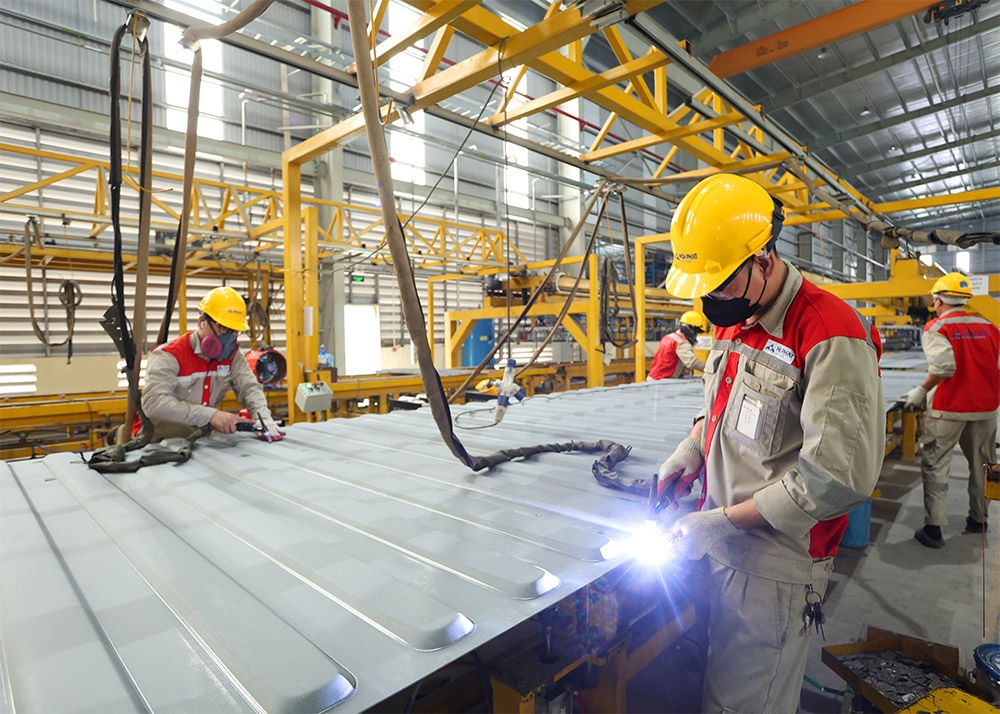Failed companies outpace new ones
Prime Minister Pham Minh Chinh last week issued an urgent directive to stimulate consumption, support production and business activities, and develop the domestic market.
 |
| Failed companies outpace new ones, illustration photo |
“To promptly address difficulties in production and business activities, stimulate consumption, promote domestic market development, contribute to growth, maintain macroeconomic stability, control inflation, and ensure major economic balances, the prime minister requests ministers, heads of ministerial-level agencies, government agencies, and chairpersons of provincial and centrally-ruled cities’ people’s committees, industry associations, and enterprises to focus on implementing a range of tasks and solutions,” the directive said.
It calls for a review of, and application of, policies to support domestic enterprises in integrating into the supply chain for supporting industrial products of foreign-invested manufacturing and exporting enterprises.
Further solutions are demanded to enhance regional connectivity, reduce transportation costs, facilitate the inter-regional circulation of goods, and support businesses to shift investment to regions with competitive advantages such as favourable production sites, abundant labour, and lower costs.
The Ministry of Industry and Trade (MoIT) has been instructed to deploy measures to assist businesses in dealing with trade defence investigations, origin fraud, and technical barriers related to the environment, sustainable development, and green transformation to boost the export of key products to major markets like China, the EU, the US, Japan, and South Korea.
Meanwhile, the Ministry of Planning and Investment has been tasked to continue promoting solutions to improve the investment and business environment and simplify processes and administrative procedures to favour investment activities by individuals and enterprises.
People’s committees of provinces and cities are also urged to implement measures to resolve difficulties in land clearance to engage and expand investment in production.
The government’s move comes amid economic growth rebounding. However, despite this recovery, domestic production still faces significant challenges, particularly regarding the index of industrial production (IIP) and enterprise performance.
The General Statistics Office (GSO) reported last week that in the first eight months of 2024, the IIP increased by 8.6 per cent compared to the same period last year, when it fell by 0.2 per cent. This modest rise indicates lingering difficulties.
“A closer look at the figures reveals that the economy remains in substantial difficulty. The on-year IIP increase for the eight-month period is based on very low, or even negative, growth rates from the same period last year,” said Nguyen Hai Van, deputy general director of Red Lotus Trading Co., Ltd., a company specialising in casual clothes and wooden products in Hanoi.
“For example, our revenue growth for clothes and wood products in the first eight months of this year is about 7 and 8 per cent on-year, respectively, but last year’s figures were minus 6.8 and 5.5 per cent. This suggests we may continue facing losses, as input material costs have risen by 12-16 per cent in the past year.”
GSO data also showed that while the textile and wood processing industries grew by 13.4 and 21.6 per cent respectively in the first eight months of this year, they had experienced on-year reductions of 5.8 and 4.8 per cent in the same period last year.
A number of industrial sectors have also witnessed an on-year drop in IIP in the first eight months of the year, such as natural gas and liquefied petroleum gas (15.3 per cent), crude oil (7.1 per cent), mobile phones (5.2 per cent), beer (3.7 per cent), and alumina (2.7 per cent), the MoIT reported.
Moreover, the corporate landscape has yet to recover. Nearly 110,800 new enterprises have been established so far in 2024. However, about 135,300 businesses ceased operations or were awaiting dissolution procedures. On average, around 16,900 businesses exited the market every month.
The Asian Development Bank (ADB) expects the Vietnamese economy to achieve solid growth this year and a slightly higher rate next year, but warns of several external downside risks: weakened global demand and the slower pace of interest rate normalisation in the US and other advanced economies.
“In recent years, the relative slowdown in growth has exposed structural vulnerabilities in Vietnam’s economy, such as the reliance on foreign direct investment-led export manufacturing, nascent capital markets, and overreliance on bank credit,” said Shantanu Chakraborty, ADB’s country director for Vietnam.
If these risks are addressed promptly, Vietnam could achieve stronger growth. Policy measures in 2024 should combine short-term growth support to strengthen domestic demand with long-term structural solutions to promote sustainable development, Chakraborty added.
The economy grew 5.66 per cent in Q1, 6.93 per cent in Q2, and 6.42 per cent in the first half of the year. The government expects the rate will be about 7 per cent this year.
| Economic growth prospects remain positive Vietnam’s economy is forecast to grow by 6.1 per cent in 2024, rising to 6.5 per cent in 2025-2026. This projection assumes an easing in manufacturing exports growth in H2 of 2024, following a 16.9 per cent rebound on-year in H1 and the expected moderation of global demand, particularly from the United States, Vietnam’s largest export market. Export growth is anticipated to firm up moderately over 2025-2026 as global trade prospects and external demand from key trade partners like the US, Eurozone, and China improve slightly. The real estate market is showing signs of recovery, expected to improve further in late 2024 and into 2025, as the corporate bond market freeze has eased and the new Land Law came into effect in August. With continued export growth and signs of a real estate recovery, domestic demand is set to strengthen in H2 of 2024 as investor and consumer sentiment improves, with total real investment and private consumption projected to grow by 5.8 and 5.6 per cent in 2024, respectively. Headline inflation in Vietnam is expected to continue rising in 2024 to 4.5 per cent, up from 3.2 per cent the previous year, driven mainly by higher food prices. This forecast reflects the recent surge in food prices, contributing most to recent inflation in H1 of 2024, and expected to continue to rise as African swine fever outbreaks spread nationwide despite measures to strengthen control and prevention. Despite continued conflicts in Ukraine and the Middle East, oil and commodity price inflation is projected to continue easing over 2024. The increase in public wages and pensions in July 2024 is expected to have a marginal impact on headline inflation given the limited size of the public sector in overall employment (two million, 3.8 per cent of total employment). However, over the medium term, inflation is forecast to return to its historical average of 3.5 per cent. The current account is expected to maintain a surplus in 2024, driven by a strong merchandise trade balance and steady foreign direct investment inflows, reflecting sustained foreign investor interest in Vietnam. Source: The World Bank |
 | Businesses increase wishes for specialised industrial parks Vietnam’s industrial areas must evolve into more specialised types to meet the increasingly diverse needs of multinational tenants. |
| Hanoi steps into semiconductor development race With its strategic location and advantages, Hanoi is moving to attract resources for the development of the semiconductor industry. |
 | More businesses carrying out green transformation At the second session of the Vietnam Industrial Park Forum 2024 on July 30, experts and businesses agreed that numerous companies are fully aware of green transition and see plenty of opportunities ahead. |
What the stars mean:
★ Poor ★ ★ Promising ★★★ Good ★★★★ Very good ★★★★★ Exceptional
Related Contents
Latest News
More News
- State corporations poised to drive 2026 growth (February 03, 2026 | 13:58)
- Why high-tech talent will define Vietnam’s growth (February 02, 2026 | 10:47)
- FMCG resilience amid varying storms (February 02, 2026 | 10:00)
- Customs reforms strengthen business confidence, support trade growth (February 01, 2026 | 08:20)
- Vietnam and US to launch sixth trade negotiation round (January 30, 2026 | 15:19)
- Digital publishing emerges as key growth driver in Vietnam (January 30, 2026 | 10:59)
- EVN signs key contract for Tri An hydropower expansion (January 30, 2026 | 10:57)
- Vietnam to lead trade growth in ASEAN (January 29, 2026 | 15:08)
- Carlsberg Vietnam delivers Lunar New Year support in central region (January 28, 2026 | 17:19)
- TikTok penalised $35,000 in Vietnam for consumer protection violations (January 28, 2026 | 17:15)

 Tag:
Tag:

















 Mobile Version
Mobile Version